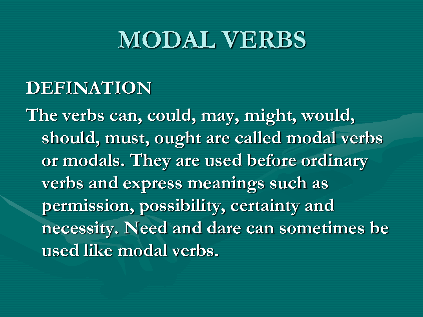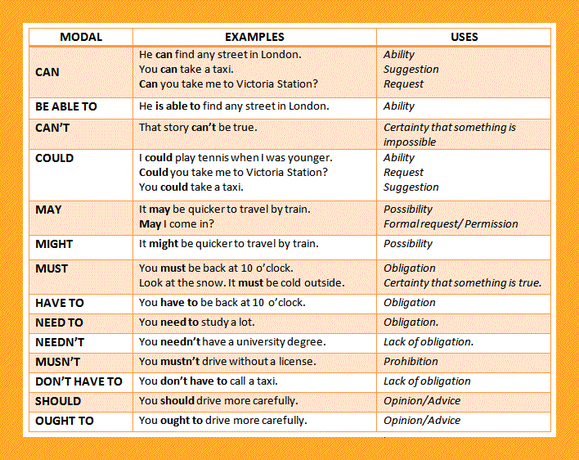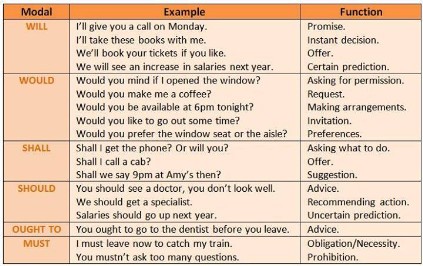 I verbi modali sono alcuni verbi che hanno le seguenti caratteristiche :
I verbi modali sono alcuni verbi che hanno le seguenti caratteristiche :
◾Sono invariabili, es: He can swim. They can swim. You can’ swim. She can’t swim.
◾Non hanno l’ausiliare nelle forme interrogativa, negativa
◾I verbi che li seguono sono all’infinito senza il TO (ad eccezione di ought)
◾Non sono mai seguiti da un complemento oggetto
CAN – COULD (POTERE) è usato per :
- esprimere una capacità o una abilità nel fare o sapere qualcosa. Esempio : He can swim = Lui sa nuotare
- per dare e ricevere un permesso (in modo informale). Esempio: Can I use your computer? = Posso usare il tuo computer?
La forma negativa di CAN si forma : CAN NOT (forma contratta CAN’T)
Esempio : He can’t swim = Lui non sa nuotare
COULD è usato :
- Per esprimere capacità/abilità nel passato. Esempio : She could dance when she was young. = Sapeva ballare quando era giovane.
- Per esprimere permesso (da notare che could è più formale rispetto a can). Esempio : Could I come to your house? = Potrei venire a casa tua?
MAY – MIGHT (POTERE) è usato :
- Per esprimere una eventualità. Esempio : Her luggage may weigh up to 20 kilos. = Il suo bagaglio può pesare fino a 20 chili.
- Per esprimere una probabilità futura. Esempio : I may go to London next week. = E’ probabile che la prossima settimana vada a Londra.
- Per esprimere permesso nel senso di dare o ricevere un permesso (da notare che may è di solito più formale di can). Esempio : May I have the bill please? = Posso avere il conto per favore?
MIGHT è usato:
- Per esprimere permesso molto formale ( come quando in italiano diamo del “lei”). Esempio : Might I ask you a favour?= Potrei chiederle un favore?
- Per esprimere una probabilità (might indica una probabilità più remota di may) Esempio: She might have missed the train = Potrebbe aver perso il treno.
Few more notes: The modal verb “may” indicates possibility.
For example,
I may have pizza for dinner tonight.
Probabilmente cenerò pizza questa sera.
It may rain this weekend.
Può piovere questo weekend.
Here you can use the modal verb “might” instead of “may” and say:
I might have pizza for dinner tonight.
It might rain this weekend.
Here “may” is slightly more formal than “might”. We sometimes use the adverbs “maybe” and “perhaps” to express possibility. “Perhaps” is more formal than “maybe”.
When referring to possible future events like the ones in the examples above, we use these adverbs followed by the future with “will”. Look.
Perhaps I will have pizza for dinner tonight.
or
Maybe I will have pizza for dinner tonight.
Forse cenerò pizza questa sera.
Perhaps it will rain this weekend.
or
Maybe it will rain this weekend.
Forse pioverà questo weekend.
Hopefully it won’t rain this weekend!
Speriamo che non piove questo weekend!
WILL – WOULD (VOLERE)
WILL è usato:
- Per esprimere buona volontà, richieste o inviti. Esempio : Will you come with me? = Vieni/Vuoi venire con me?
- Per offrire qualcosa ( di solito seguito da have + sostantivo). Esempio : Will you have a cup of coffee? = Prendi/Vuoi una tazza di caffè.
- Per esprimere il futuro. I will go to school tomorrow = Andrò a scuola domani.
- Per esprimere una previsione specifica. Esempio : The match will start soon. = La partita inizierà presto
WOULD è usato:
- Per esprimere buona volontà, richieste o inviti (più formale rispetto a will) Esempio : Would you please do it for me? = Lo faresti/Vorresti farlo per me?
- Per esprimere un’azione abituale nel passato, traducendolo con l’imperfetto indicativo o con ERO SOLITO. Esempio : When I was young I would play volleyball. = Quando ero giovane giocavo/ero solito giocare a pallavolo
SHALL – SHOULD – OUGHT TO (DOVERE)
SHALL si usa SOLO nella forma interrogativa per la 1°persona singolare (I) e plurale (WE) e ha le seguenti funzioni:
- Fare proposte o dare suggerimenti. Esempio : Shall we go? = Ce ne andiamo? Dobbiamo andarcene?
- Offrirsi di fare qualcosa. Esempio : Shall I turn off the radio? = Spengo la radio? Vuoi che spenga la radio?
- Chiedere un parere o un consiglio in modo formale. Esempio : Where shall I go? => Dove vado? (Dove devo andare?)
SHOULD e OUGHT TO si usano :
- Per dare suggerimenti, consigli e raccomandazioni. Esempio : She should quit smoking. = Dovrebbe smettere di fumare. OPPURE You ought to go to the doctor. = Dovresti andare dal dottore
- Per fare un rimprovero. Esempio : You shouldn’t behave like that! = Non dovresti comportarti così
- Per fare una supposizione. Esempio : The match ought to start in one hour = La partita dovrebbe iniziare tra un’ora.
- … should use … for -ing. Esempio : You should use salt for cooking – (Tu) Dovresti usare il sale per cucinare.
MUST (DOVERE)
- Per esprimere l’obbligo di far qualcosa
- Per esprimere l’obbligo di far qualcosa con gli altri tempi verbali si usa have to
- Per esprimere una raccomandazione
- Per esprimere una supposizione
- Per esprimere un divieto (mustn’t)
La forma al passato di Must non esiste; nel caso affermativo, si può dire had to. Nel caso negativo si ricorre a didn’t have to. Esempio: Dovevo dire molte cose –> I had to say a lot of things
Semi-modal verbs (used, ought, need, dare) are followed by a to-infinitive:
- They used to live by the sea.
- You ought to know that by now.
- Do you need to use the hairdryer?
- He didn’t dare (to) look back.
Ecco un video per la pronuncia…
“Must” expresses obligation and “mustn’t” expresses prohibition.
Look at some rules you might find on a piece of paper on the wall in a classroom where people are studying English.
Osserva alcune regole che potrebbero trovarsi alle pareti di un’aula d’inglese.
You must listen to the teacher.
Devi ascoltare l’insegnante.
You must do your homework.
Devi fare i compiti.
You must try to speak in English at all times.
Devi cercare di parlare sempre in inglese.
You must follow the teacher’s instructions.
Devi seguire le istruzioni dell’insegnante.
You mustn’t chew gum.
Non devi mastigare gomme.
You mustn’t shout.
No devi gridare.
You mustn’t speak when the teacher is speaking.
Non devi parlare quando sta parlando l’insegnante.
You mustn’t run in the classroom.
No devi correre nell’aula.
The most important rule when studying English in a classroom is “You must try to speak in English at all times”!
A good rule for online students is “You must try to write to your teacher in English at all times” 😉

